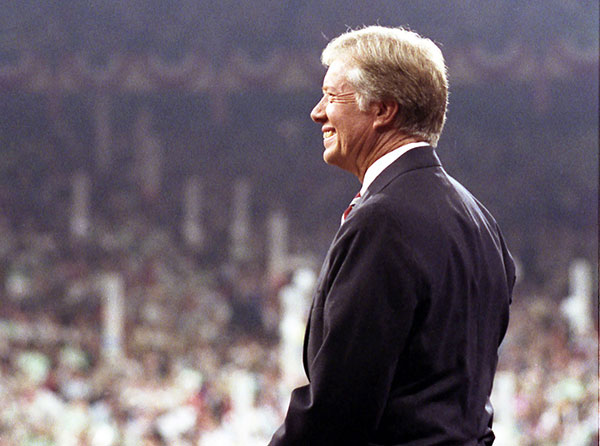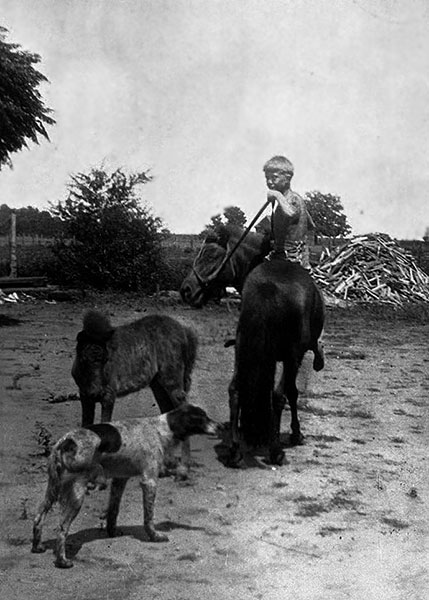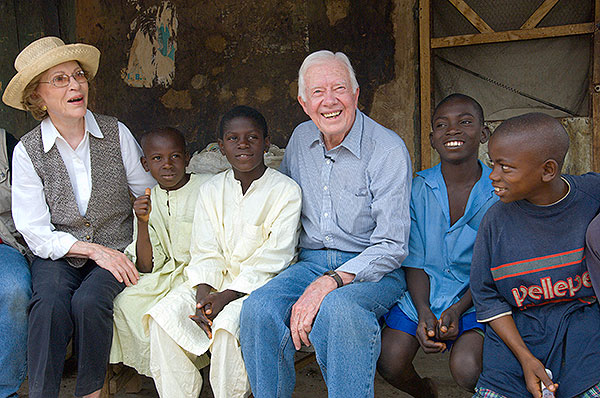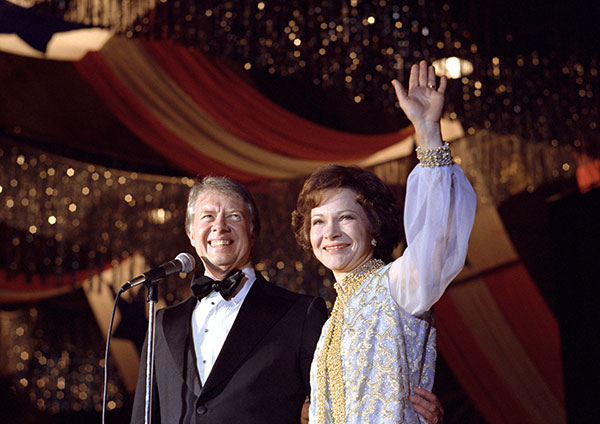The Life of James Earl (Jimmy) Carter Jr.
39th President of the United States

Jimmy Carter accepts the presidential nomination of his party at the Democratic National Convention, August 14, 1980. (Credit: Jimmy Carter Presidential Library)
Jimmy Carter was a man of high principle, steadfast integrity, and deep religious faith who dedicated his life to public service. As private citizen and public official he pursued the causes of human rights, peace, and care for the least fortunate with passionate determination and boundless energy.
Throughout his life, he repeatedly placed what he believed to be right above personal and political considerations. His quiet voice and ready smile masked a bulldog determination and an aversion to compromise on matters of principle.
In his 1977 inaugural address, President Carter quoted the prophet Micah: “What doth the Lord require of thee, but to do justly, and to love mercy, and to walk humbly with thy God?” For many who knew and worked with him, those words aptly summarize his life of faith and service.

In 1928, the Carter family moved to a 350-acre farm near Plains in the tiny community of Archery, Georgia. A young Jimmy Carter is pictured here atop his Shetland pony named Lady. (Credit: Jimmy Carter Presidential Library)
Jimmy Carter grew up on a farm near the small town of Plains in southwest Georgia and graduated from the United States Naval Academy. As an officer serving in the Navy’s elite nuclear submarine program, he planned a career in the military. Those plans were cut short by his father’s death when, inspired by the many tributes to his father’s contributions to individuals and the community, he decided to return home. After a few difficult years, the family farm and business prospered, and his interests turned again to public service.
He won election as a Georgia state senator in 1962 and 1964 and as governor in 1970. As was to be the case in his presidency, Jimmy Carter’s service in those two offices was marked by the determination to engage difficult and controversial issues—including racial discrimination and government waste—and do what he felt was right regardless of political consequences.
Jimmy Carter rose from virtual political obscurity in 1976 to win election as the 39th president of the United States. He led an extremely active administration, taking on a weighty accumulation of controversial problems and issues, and initiating reforms that continue to benefit the nation and the world.

In Nigeria, former U.S. President Jimmy Carter and former First Lady Rosalynn Carter visit with young victims of schistosomiasis disease during a 2007 trip to assess Carter Center health programs. (Credit: The Carter Center)
As a former president, he was equally dedicated to public service in his work through The Carter Center, which he founded with his wife, Rosalynn. He was widely acclaimed for his relentless campaigning for human rights, mediating conflicts around the world, and fighting debilitating diseases in developing countries. In 2002, he was awarded the Nobel Peace Prize for his humanitarian efforts and for his commitment from the time of his presidency to “the principles that conflicts must as far as possible be resolved through mediation and international co-operation based on international law, respect for human rights, and economic development.”
In a 2013 Washington Post interview, he was asked how he wanted to be remembered. His response: “As a champion of human rights. Human rights are more than just freedom of speech, the right to elect one’s own leaders, and freedom of assembly. They also include the right to a home, access to adequate health care, and to live in peace. That is how I want to be remembered, for human rights and peace.”

President and Mrs. Carter wave to inaugural ball guests on the evening of January 20, 1977. (Credit: Jimmy Carter Presidential Library)
President and Mrs. Carter married in 1946 and had four children. The Carters often described their relationship as a full partnership in which they were each other’s best friend. He was a devoted father, grandfather, and great-grandfather.
Jimmy Carter was a deeply religious man, a Baptist lay leader, teaching Sunday school most of his adult life while at the same time adamantly adhering to the separation of church and state. For three decades, he and Mrs. Carter spent one week a year helping build housing for the poor through Habitat for Humanity. He was the author of 32 books. He also was a skilled woodworker, accomplished painter, and an active outdoorsman, enjoying fishing, hunting, and birding throughout his life.
Observers found Jimmy Carter to be resolute and implacable when faced with challenges, which he met with perseverance and pragmatism supported by his bedrock religious faith. He was relentlessly energetic, seemingly perpetually in motion, and his attention to even the tiniest program or policy detail was legendary. His calls for human rights, relief for the sick and oppressed, and religious tolerance were imbued with a sense of higher moral purpose and were favorably and admiringly received throughout the world, even by many of those who did not look kindly on his White House years.
Next: The Early Years »





